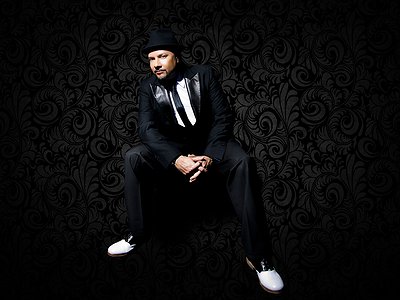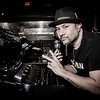Part 1
Name: Louie Vega
Nationality: American
Occupation: Producer, Performer, DJ
Current Release: Starring... XXVIII on Vega Records.
Selected Bands/Projects: Elements of Life, Masters at Work, Nuyorican Soul
Musical Recommendations: Anane Vega , Nulu movement, Josh Milan, Honeycomb music
If you enjoyed this interview with Louie Vega, you can find more information about him on his Facebook profile.
When did you start writing/producing music - and what or who were your early passions and influences?
I started producing music in the year 1986. My early passions had a very broad range from the sounds of Quincy Jones, Stevie Wonder, Barrabas, War, Gil Scot Heron, Prince, Earth Wind & Fire, Michael Jackson, Gamble & Huff, to the sounds of the bronx at the center of the projects with Afrika Bambaataa, Jazzy Jay, Red Alert, Afrika Islam, to the sounds of Fania with Hector Lavoe, Willie Colon, Eddie Palmieri, to the sounds of the Loft & Paradise Garage, which I lived vicariously at first through my older sisters 'til I was old enough to get into clubs. also loved the sounds of Talking Heads, Ian Dury & The Blockheads, B52s, Arthur Baker, and the UK new wave movement. producers like Trevor Horn, Tommy Lipuma, Sly & Robbie, the Mizelle Brothers, Willie Colon, Patrick Adams & more. Music was always in my life 24/7.
For most artists, originality is first preceded by a phase of learning and, often, emulating others. What was this like for you? How would you describe your own development as an artist and the transition towards your own voice?
Of course I was influenced by my teachers. As a DJ I listened to Larry Levan, Bruce Forest, and Tony Humphries. They were my favorites and I developed my style with a little of each of them but with my musical choices and ideas. It was years of going to clubs and absorbing the music, how it was played, how it sounded different because of DJs like the above, and feeling the connection with the people from the booth. I was lucky to be able to hang out in the booth when Tony Humphries and Bruce Forest DJ’d. I was in the booth while Larry Levan played once which was a huge deal for me to see the icon up close working his craft.
As a musician, I have a huge record collection and that became my library, sort of like having books, there were lots of liner notes and art. You read who played what, and what instruments were used. Names of musicians, singers, producers and as you collect you realize you are buying records from producers of the same name on each of the records / styles you like. So there is a pattern where you are loving what this producer / singer / musicians does. It happened to me with the producers I named above in the previous answer.
I also took piano lessons due to my father wanting me to play an instrument. It was 5 years of classical from ages 6 - 11. I then left the piano and later came back to it at age 23 and was taught by some of the greatest latin jazz musicians: Oscar Hernandez & Ricky Gonzalez. I spent a lot of time with Eddie Palmieri as well making an album and there he gave the best pointers one could ever have.
All this over the years was absorbed and helped me be the producer I’ve become today. I eventually created my way of making records and playing them over the years, found my identity.
What were your main compositional- and production-challenges in the beginning and how have they changed over time?
My main compositional challenges:
Reading music:
I read only a little, but not enough to write music on paper. I did study some theory with my piano teachers which helped with my playing on keyboards, but I was always good with grooves, playing bass on left hand, keyboard and chord movements on my right hand. Creating hooks within the groove itself. Examples are: “Beautiful People”, “Stay Together” - all by Barbara Tucker, “Love & Happiness” - River Ocean, lots of the early Masters at Work productions from 91 - 96, Kenlou Projects, Elements of Life various songs and more.
Later in life I worked with composers like Vince Montana JR, who wrote from scratch on paper, arranged large orchestral music, and produced as well, and I learned a lot from him while working on the Nuyorican Soul Project where he did string and horn arrangements. That is a whole other level.
As producer I learned through the years how to get the best performance out of a musician or singer and arranging is a strong forte I have. I can create an entire song just from a small idea. when I’m in the creative state, I make 3-4 tracks a night which eventually become the foundation to full-on produced songs.
Compositional challenges:
Not being a fluent lyricist. I’ve always collaborated with lyricists/songwriters throughout my career. I can come up with hooks and lines but not full-on verses. but I always knew what I wanted the song to be about in most cases. It actually is wonderful working this way collaborating with others, it would never be the same idea if it was just you alone. Instrumentals I could write many of.
Now it's way different than it was long ago. I could actually do the entire piece if I wanted regarding the music but still love the collaborating with lyricists and other songwriters. Some of my collaborators: Josh Milan (lyricist / musician), Axel Tosca (keyboardist), Anane Vega (lyricist), Duane Harden (lyricist), Lem Springsteen (lyricist), Leah Lorien (lyricist), Kevin Hedge (lyricist), Byron Stingily, N’Dea Davenport, Caron Wheeler, to name some of the recent works.
Tell us about your studio, please. What were criteria when setting it up and how does this environment influence the creative process? How important, relatively speaking, are factors like mood, ergonomics, haptics and technology for you?
My studio is called Daddy’s Workshop, in New Yersey. It is located in the lower part of my home.
Love working there, the mood is magic, there are lots of vinyl records everywhere in cubes, and there are pictures of many I’ve worked with over the years. There is a DJ set-up on one side of the room, which resembles that of one of the NYC super clubs back in the day, and there is a studio set-up on the other side. They are face to face with each other. from the scent of the room to the lighting the mood is just perfect for making music, and when anyone comes over, the feeling is just right for them to perform at best. Everyone who has been there loves it and magical recording sessions have happened for over 10 years.
Technology is very important, sounds help inspire in the writing, producing and creative process. Always looking for more sounds in keyboards whether analog or plug-ins we have plenty to experiment with. If a new piece is intriguing we will have it and the creations come about. We have lots of microphones and have the knowledge on how to record live musicians. We’ve recorded some of the top musicians and artists over the years at Daddy’s Workshop.
What are currently some of the most important tools and instruments you're using?
For one we record on Protools. We record straight into it and the pre-recording process can take a minute 'til we get it where we want it sonically. From choosing the right mic to the texture of the sound and everything in between we work hard on it. Check out albums: Elements of Life Eclipse, Louie Vega starring…xxviii for some examples of our recordings and mixes as well.
There are so many tools we use. Once we get that sound we want then it's getting the performance in place from the one we are recording.
Many contemporary production tools already take over significant parts of what would formerly have constituted compositional work. In which way do certain production tools suggest certain approaches, in which way do they limit and/or expand your own creativity? Are there any promising solutions or set-ups capable of triggering new ideas inside of you as a composer?
For me it's basics. I write music on my Fender Rhodes or Wurlitzer, or I find a plug-in of Rhodes, and start there. I don’t get too complicated, once I have the sound to write with all is golden and I’m on my way to putting together the foundation and movement of the track. If I find a new sound on a plug-in it can trigger a whole idea. Once the sound is in place I may tweak it as well getting the attack where I want it or the release. Then the texture of the sound - sometimes I may tweak that too. It happens in many ways more than once when in the creative compositional process. Nothing is promising but once the sound is there it will make my mind turn and play some cool grooves if the session goes the way it should.
Could you describe your creative process on the basis of a piece or album that's particularly dear to you, please? Where do ideas come from, what do you start with and how do you go about shaping these ideas?
When I work on an album I usually start with tracks I’ve created to give it a base, a cluster of grooves. I then start working with lyricists to get the first few songs. then I choose the artist. Sometimes the artist is already on board and I may have something in mind for them, or I will speak to them and see what they want to talk about. If I’m working with another lyricist I will convey that to the lyricist along with my ideas. Or in some cases the artist writes lyrics so it can work that that way as well. I’ll come with a track and hand over to the artist then they will either feel the track or may want more and I will go back in and add more to compliment what the artist wanted, then they will start with lyrics. I will check the first phase of lyrics starting with the title. It has to hit me regarding the title, then if we are good move on and let's get the lyrics in place. I may have melody on a piano, or Rhodes already which guides the lyricist to follow my melody, or the lyricist / artist may have a melody already then I will compliment it later in my production. That’s just a few of many ways it can come about.






